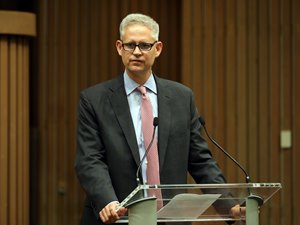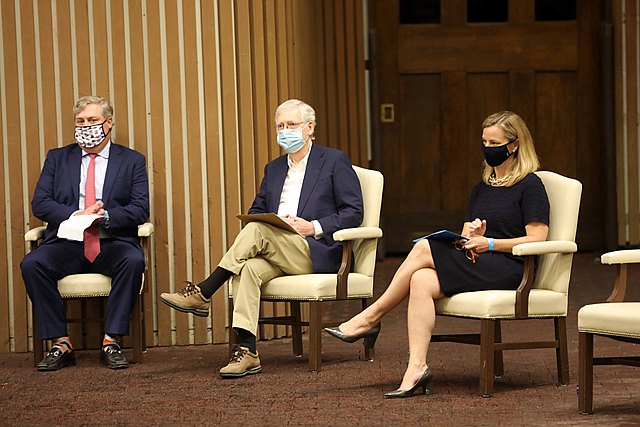Industry, Animal Welfare Groups Applaud Passage of HISA


After the Senate approved the Horse Racing Integrity and Safety Act late Dec. 21, the coalition of industry and animal welfare groups that backed it after years of effort expressed their eagerness for its implementation.
The Senate advanced HISA when it approved an omnibus bill Monday night crafted around a $1.4 trillion funding package that would prevent a government shutdown. As part of the omnibus bill HISA, the industry landmark legislation that would overhaul oversight of racing's drug and medication rules and its equine drug testing, now awaits President Donald Trump's signature.
The industry legislation already had been passed by the House of Representatives. The House action followed Senate Majority Leader Mitch McConnell (Republican, Kentucky) voicing his support for the legislation—with some tweaks to the previous House bill—in an Aug. 31 press conference at Keeneland. The House bill was updated to include those changes and approved about a month later.
McConnell believes the legislation, which had bipartisan support, will strengthen Kentucky's signature industry.
"Kentucky's cherished horse racing traditions deserve to be protected. I'm proud the Senate agreed to pass my legislation to preserve our signature racing industry and the 24,000 workers who support it," McConnell said. "With the leadership of Congressman Andy Barr and the partnership of sport leaders, horse advocates, and fans, we're one step closer to promoting fairness and safety across Thoroughbred racing. As Majority Leader, I made this Kentucky-focused legislation a top priority in the Senate. I look forward to this major advancement for our beloved sport becoming law."
On the House side, the bipartisan legislation was championed by Barr (Republican, Kentucky) and Rep. Paul Tonko (Democrat, New York). They had noted the state-to-state approach in regulating medication and drug testing had lacked uniformity, relied too much on post-race testing, and too often sees active participants—or people with close ties to the sport's participants—making decisions from their roles on regulatory boards.
Barr believes better days are ahead for horse racing.
"With today's passage of HISA in Congress we are in the final stretch of achieving the most transformational and consequential reform of the Thoroughbred horse racing industry since enactment of the Interstate Horseracing Act of 1978," Barr said in a release late Monday. "For almost a decade, I have worked with industry stakeholders and my Congressional colleagues to build consensus around reforms that will protect equine athletes and strengthen confidence and international competitiveness in the sport.
"I am proud to champion this historic, bipartisan legislation with Congressman Paul Tonko and Leader McConnell and I look forward to President Trump signing it into law."
The years-long, sustained push for the legislation came from The Jockey Club and prominent breeders who rallied support through the Water Hay Oats Alliance.
"I'd like to thank Senate Majority Leader McConnell for diligently focusing on getting this much-needed bill included in the must-pass Omnibus Appropriations Bill," The Jockey Club chairman Stuart Janney III said in a release. "Leader McConnell has been a powerful force when it comes to promoting and supporting the Thoroughbred industry in Kentucky and throughout the nation.
"With the passage of this bill, we restore confidence with our fans that the competition is clean, the game is fair, and the horse and rider are protected."
WHOA managing member Staci Hancock noted the prolonged effort to pass the legislation.
"This is the day that the members of the Water Hay Oats Alliance (WHOA) have long been waiting for," Hancock said. "Since 2012 our grassroots movement has supported the passage of federal legislation to prohibit the use of performance-enhancing drugs in horseracing. The Horseracing Integrity and Safety Act brings much needed drug and medication reform, as well as national track safety standards, to our sport. It is with great pride and complete satisfaction that WHOA celebrates the bill's passage. We thank Senate Majority Leader Mitch McConnell and House Sponsors, Congressmen Andy Barr and Paul Tonko, for getting it across the finish line."
A key for picking up momentum on the bill was reaching out to animal welfare groups to secure additional support for the legislation, which over the years faced opposition from within the industry by horsemen's groups that raised concerns about banning the diuretic Lasix, potential new costs, and potential issues with the new regulatory approach. Although horsemen's groups like the New York Thoroughbred Horsemen's Association would get on board this year, the National Horsemen's Benevolent and Protective Association continued to oppose the legislation.

But the coalition won the day Monday—despite the industry not being completely on the same page.
"This is a blue ribbon moment in the history of American horseracing, and this well-crafted measure sets the bar high and is a reminder that goodwill is indispensable in our politics," said Kitty Block, CEO and president of the Humane Society of the United States. "Working together with stakeholders to get it across the finish line, Senator McConnell and other leaders have helped to put the industry on a strong path to positive reforms."
The Thoroughbred Horsemen's Association said it will work to bring about a smooth transition to the new approach in oversight.
"Although the bill is not perfect and has caused some concerns that we understand, it is clear that this new paradigm for the industry is necessary if we are serious about the future of our sport," said THA chairman Alan Foreman in a statement. "We are particularly pleased that the original bill was expanded to mandate safety and welfare standards for our horses as we have been doing in the Mid-Atlantic region, and a better-defined role for USADA that speaks to their strengths and our needs.
"As we've said previously, we intend to roll up our sleeves and collaborate with our industry partners and the new authority to achieve a seemless transition. While change is never easy, and valid concerns must be addressed and resolved, we are at a critical time for our industry. The enactment of the Horseracing Integrity and Safety Act provides us with a unique opportunity to change the image of our sport and engender confidence in the future."
A key moment for the bill's hopes occurred when Churchill Downs Inc. put its support behind the bill. In late August, CDI CEO Bill Carstanjen noted that some compromises and changes made by McConnell—calling for standard safety measures and allowing states a three-year waiver for Lasix in some races—brought the powerful track owner on board.
"Senator McConnell's leadership has been critical in bringing the Thoroughbred industry together and prioritizing the passage of the Horseracing Integrity and Safety Act," said Carstanjen in a statement. "This is a pivotal moment for the future of horse racing, a sport that will now be governed by world class, uniform standards across the United States."
Keeneland, which had supported the legislation from early on, and the New York Racing Association applauded the advancement of the bill.
"The passage of HISA is a landmark moment for the Thoroughbred racing community's ongoing efforts to ensure our horses are running under the safest and most transparent conditions possible and to protect the integrity of the sport for our athletes, horsemen, and fans," said Keeneland president and CEO Bill Thomason and president-elect Shannon Arvin in a joint statement. "The independent authority established by HISA will bring a level of consistency and accountability that will improve our sport for years to come as they work to develop and implement uniform anti-doping, medication control, and operational measures. Keeneland is honored to have been involved in this ground-breaking legislation."
"This is a monumental step forward that will help secure the future of Thoroughbred racing in the United States," said NYRA president and CEO Dave O'Rourke. "For the first time, the sport will have a unified set of national safety and integrity standards to replace an outdated system that relied on patchwork regulation. The HISA will achieve the type of reforms long supported and advanced by NYRA, including a national approach to medication control and strongest anti-doping authority the sport has ever seen. This legislation will further modernize horseracing and arrives at a critical juncture in its history. NYRA looks forward to the work that lies ahead."
Breeders' Cup also had been a long-time supporter of the legislation.
"This marks the single most significant safety and integrity development in the history of Thoroughbred racing. This moment also demonstrates that great progress can be accomplished when the industry works together," said Drew Fleming, president and CEO of Breeders' Cup, in a release. "We recognize that there is more to be done and we look forward to working with our counterparts to build on this momentum and further improve the sport for generations to come."
For years the National Thoroughbred Racing Association did not take a position on the federal legislation, noting the division within the sport. In a statement Monday, it said it looks forward to the new approach.
"We look forward to President Trump signing the HISA into law and by doing so, commencing the establishment of an independent and well-informed central authority that will ensure the integrity of our sport and the safety of our human and equine athletes nationwide," said NTRA president and CEO Alex Waldrop.
Breeders' Cup and those top track owners had formed the Thoroughbred Safety Coalition last year to work toward changes within the industry. The TSC also applauded the federal legislation in a statement from the coalition.
"The passage of the Horseracing Integrity and Safety Act marks a historic moment for Thoroughbred racing as we embark on a new path to a better, safer sport for all," the TSC said. "The formation of the independent Horseracing Integrity and Safety Authority as a vehicle to establish and implement uniform medication rules and operational standards will codify the culture of safety and integrity that the Thoroughbred Safety Coalition was founded to strengthen and protect. We would like to thank the leaders of the House and Senate for bringing the industry together to build consensus on a comprehensive approach to ensuring the safety and wellbeing of our athletes and participants, a priority shared by every member of our community.
"HISA has given all of us a mandate to build on the unprecedented display of unity that brought us to where we are today to enhance safety and accountability in our sport. The Coalition and our members will continue to identify and advocate for the implementation of uniform safety and integrity reforms across state racing jurisdictions alongside and in conjunction with the Authority."
The Kentucky Equine Education Project sees potential for the bill to move Kentucky racing and breeding forward.
"KEEP has been at the forefront of the industry in calling for uniform safety standards," said KEEP's executive vice president Elisabeth Jensen in a statement. "This legislation is critical for Kentucky's signature industry and we are thankful to the Commonwealth's members of Congress who championed this issue. We look forward to working with our industry partners in the implementation of these new safety standards."
